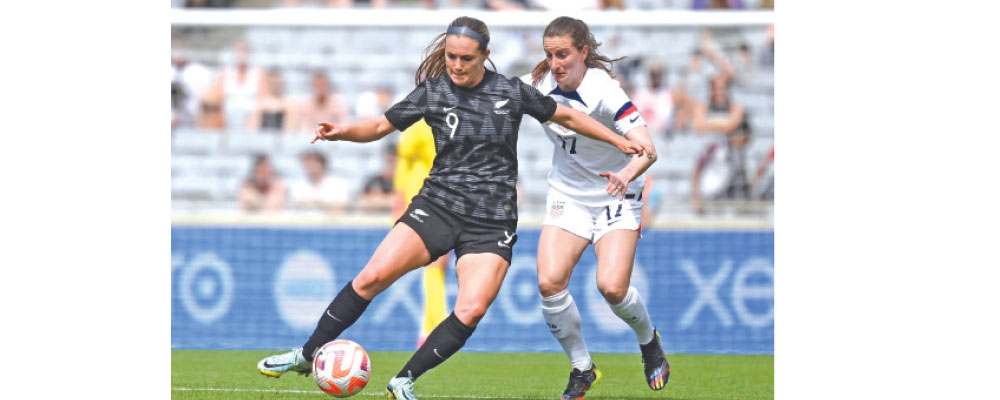
Wellington, July 2: New Zealand’s youthful Football Ferns face an almost impossible mission as co-hosts of the Women’s World Cup — ranked 26th in the world and without a win in its last 10 matches. Tougher still, it has a hard act to follow.
The Ferns’ rugby counterparts, the Black Ferns, won the Women’s Rugby World Cup in New Zealand last year. In the final, which was played at Eden Park in Auckland in front of the largest crowd for a women’s rugby match, the Black Ferns beat an England team which had set a world record for most consecutive wins.
In a country where rugby rules as the national sport, New Zealanders were captivated by the Black Ferns, who entered the tournament as substantial underdogs. Players became local celebrities and won new ground for women’s sports in New Zealand.
The Football Ferns face their soccer World Cup in the shadow of that campaign, with heightened expectations and in front of a public hungry for more international success. They are much greater underdogs than the Black Ferns; in six World Cups they have never won a match.
New Zealanders turned the Rugby World Cup into a national celebration but, if the Football Ferns can’t achieve something extraordinary, the Women’s World Cup is in danger of becoming a party at which the hosts leave early.
It will take a lot, particularly early success, to bring big crowds to the games and match those at the Rugby World Cup, where 43,000 watched the final. Early ticket sales were much more brisk in Australia than in New Zealand, where soccer doesn’t have as much of an established audience.
In the hope of recapturing the magic, Football Ferns coach Jitka Klimova has taken advice from Black Ferns coach Wayne Smith, who received a knighthood in part because of the World Cup success.
“He is amazing,” Klimkova said. “I hadn’t met him in person before and our conversation was just incredible. I always loved the way he coached the team and loved how he was communicating about his players and the way he was connecting with his players.
“The biggest takeaways from him would be enjoying this journey for everybody who is involved and connecting. Connecting is something we have been working so hard on, connection on the field and off the field. It’s a never-ending story.”
Connecting is harder for the Football Ferns. The squad is one of the most far flung in the tournament, drawing on players based in England, Scotland, Finland, Sweden, Denmark, the United States, Australia and New Zealand. With a relatively light schedule of matches each year, forming a cohesive unit is difficult.
But Klimkova has had time over a nine-week training camp to gradually pare down her final World Cup squad and the players have been training together during that period, which is likely the most extended camp they’ve experienced with the national team.
“It’s a great opportunity for us to be ready physically and to be ready mentally,” Klimkova said.
The Ferns’ recent performances haven’t been impressive. In three matches against the defending champion United States team, they lost 5-0, 4-0 and 5-0. Against Olympic champion Canada, they lost 5-1 and 1-0. They also lost to Japan 2-0, to Portugal 5-0 and had a pair of losses — 2-1 and 3-1 — to co-host Australia.
A pattern emerges not just of the series of losses but of too few goals scored and too many conceded.
“We have to really make better decisions in front of the goals so that we can score goals, and then better decisions defensively in front of our goal so that we are not conceding such soft goals that we conceded in the past,” Klimkova said. “So I am happy with our improvement box to box, but we need to get better inside of the box.”
Professional opportunities came late for most of the current group of New Zealand players. The Wellington Phoenix, New Zealand’s only professional men’s team, established a women’s team in 2021 and it plays in Australia’s A-League competition. That provides a pathway for women from amateur local leagues to professionalism.
New Zealand women often have joined American colleges or sought professional opportunities overseas. Prominent among them are Anna Leat, a goalkeeper with Aston Villa; C.J. Bott, a defender with Aston Villa; and Ashleigh Ward, who plays for Southampton. Annalie Longo, who currently plays in New Zealand, has made 127 appearances for the










